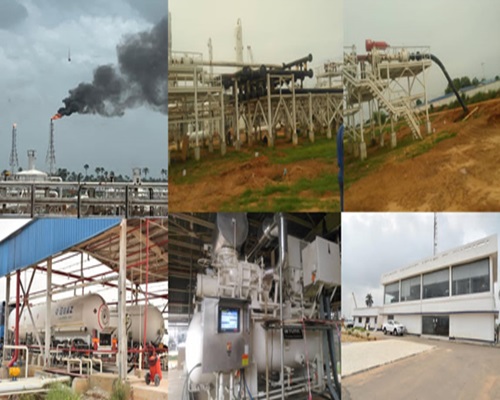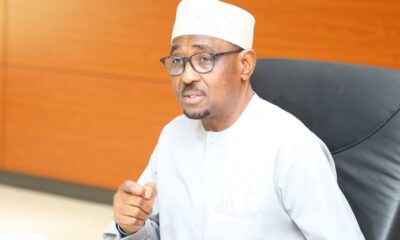Energy
Marketers demand monitoring of PMS distribution
Available data has shown that average daily petrol consumption in Nigeria has fallen by 28 per cent since President Bola Tinubu scrapped subsidy on the fuel at the end of May.
Average daily petrol consumption fell to 48.43 million litres in June, down from the previous average of 66.9 million, according to figures released to Reuters by the Nigerian Midstream and Downstream Petroleum Regulatory Authority (NMDPRA).
This information was further confirmed by the development the President of Petroleum Retail Outlet Owners Association of Nigeria (PETROAN) , Billy Gillis-Harry.
He said that marketers have recorded downward retail sales perhaps because of hike in pump price.
The PETROAN President however advised Government to further authenticate its data using a new tool developed by the Association.
According to him, his Association has developed a framework that could support government transparently and effortlessly collate adequate consumption data on petroleum consumption in the country.
Gillis-Harry, said that PETROAN has developed the Petroleum Products Passport, PPP, a tool that can be perfectly deployed by the industry to transparently monitor products supply and distribution across the country.
While, commending the present administration for mustering the political will to exit the petrol subsidy regime the PETROAN president called for sustainable efforts to fix the nation’s refineries.
The subsidy regime had kept prices cheap for decades but it became increasingly expensive for the country.
Nigeria reportedly spent $10 billion last year on subsidy-leading to wider deficits and driving up government debt.
Since the subsidy was ended a black market in neighbouring Cameroon, Benin and Togo that relied on petrol smuggled from Nigeria has collapsed.
Despite having spent $2.41 billion on the subsidy in the first five months, Nigeria could save up to $5.10 billion this year from scrapping the petrol subsidy and from FX reforms, the World Bank said on June 27.
Also, reports have indicatedd that the Independent Petroleum Marketers Association of Nigeria, IPMAN, has inched further with its projected mass rollout of Compressed Natural Gas, CNG, refilling outlets across the country with seven banks ready to manage revolving fund facility from the African Development Bank, AfDB.
According to reports, the IPMAN had sealed the deal with the bank following removal of petrol subsidy.
National President of IPMAN, Elder Chinedu Okoronkwo was quoted as confirming the development.
The Association is said to have made the approach after it conducted a market survey on the cost of converting existing petrol stations to CNG outlets
IPMAN has already commenced identification of members interested in co-locating CNG dispensers and infrastructure on their existing petrol retail outlets.
The exercise is to identify qualified potential candidates for loans to support its target of establishing 10-20 colocated CNG stations in each state of the federation during the first phase of its planned nationwide rollout.
Energy
Over 500mmscf/d gas supply projects to be commissioned — Presidency


The Presidency has disclosed plans to commission over 500mmscf/d gas supply projects across the country.
This is in line with the country’s move to transition from fossil fuels to gas according to its Decade of Gas initiative.
In a press statement on Friday, the spokesperson to the President, Ajuri Ngelale outlined three projects the President is billed to commission.
The statement reads: “In line with his commitment to significantly leverage gas to grow the economy, President Bola Tinubu will commission three critical gas infrastructure projects being undertaken by the Nigerian National Petroleum Company Limited (NNPCL) and partners.
“The projects support the federal government’s effort to grow value from the nation’s gas assets while eliminating gas flaring.
“The delivery of the projects was accelerated from the inception of the administration in keeping with the overall objective of deepening domestic gas supply as a critical enabler for economic prosperity.
“The projects lined up for commissioning include: (1) AHL Gas Processing Plant 2 (GPP – 2) – 200mmscf/d. This project is an expansion to the Kwale Gas Processing Plant (GPP – 1), which currently supplies about 130MMscf/d of gas to the domestic market. The processing plant is designed to process 200MMscf/d of rich gas and deliver lean gas through the OB3 Gas Pipeline. This additional gas supply will support further rapid industrialization of Nigeria. ”The plant will also produce about 160,000 MTPA of Propane and 100,000 MTPA of Butane, which will reduce the dependency on LPG Imports. The AHL Gas Plant is being developed by AHL Limited, an incorporated Joint Venture owned by NNPC Limited and SEEPCO.”
“(2) ANOH Gas Processing Plant (AGPC) – 300MMscf/d. The ANOH gas plant is an integrated 300MMscf/d capacity gas processing plant designed to process non-associated gas from the Assa North-Ohaji South field in Imo State. The plant will produce dry gas, condensate, and LPG. The gas from ANOH gas plant will significantly increase domestic gas supply, leading to increased power generation and accelerated industrialisation. The ANOH Gas Plant is being developed by ANOH Gas Processing Company, an incorporated Joint Venture owned by NNPC Limited and Seplat Energy Plc on a 50-50 basis.
“(3)ANOH-OB3 CTMS Gas Pipeline Project. The project involves the engineering, procurement, and construction of 36”x23.3km ANOH-OB3 Project. The Transmission Gas Pipeline will evacuate dry gas from the Assa North-Ohaji South (ANOH) primary treatment facility (PTF) to OB3 Custody Transfer Metering Station (CTMS) for delivery into the OB3 pipeline system. About 600MMscf/d is estimated to be available from two separate 2 x 300MMscf/d capacity gas processing production trains from AGPC & SPDC JV.”
“When commissioned, the projects will increase gas supply to the domestic market by approximately 500mmscf/d, creating a better investment climate and promoting balanced economic growth cumulatively.”
Energy
Shell signs agreement to build gas pipelines in Oyo State


Shell Nigeria Gas, SNG, and the Oyo State Government have signed an agreement to develop a gas supply and distribution infrastructure that will deliver gas to industrial and commercial users in the state.
A statement released on Friday by Shell Nigeria’s Media Relations Manager, Abimbola Essien-Nelson, disclosed that SNG will build and operate the gas distribution network, which will serve customers across Oyo State for 20 years.
According to the statement, the project will start with the construction of gas distribution infrastructure along a 15km pipeline route, adding that it will grow to deliver up to 60 million standard cubic feet of gas per day across the state.
Speaking at the signing ceremony, the Oyo State Governor Seyi Makinde, described the project as a catalyst for development in the state.
The Managing Director of SNG, Ralph Gbobo, noted that the agreement was “a significant milestone for SNG and Oyo State to boost economic activities in Nigeria by supplying industries and manufacturers with natural gas, a more reliable, cost-efficient and environmentally friendly source of energy.”.
He explained that the project would boost Oyo State’s internal revenue and create Job opportunities for indigenes.“
“The Managing Director of The Shell Petroleum Development Company of Nigeria Limited and Chairman, Shell Companies in Nigeria, Osagie Okunbor, remarked that the event pointed to the value of partnership as “Shell continues to power progress” in Nigeria through more and cleaner energy solutions for commercial and industrial customers.
Energy
Nigeria ripe for nuclear power to boost electricity generation – NAEC


The Nigeria Atomic Energy Commission (NAEC) in collaboration with Centre for Energy Research and Training (CERT), Ahmadu Bello University (ABU), Zaria would deploy nuclear science and technology to strengthen electric power generation in Nigeria.
Prof. Yusuf-Aminu Ahmed, Chairman NAEC disclosed this during the 20th Anniversary Symposium of the Nigeria’s first Nuclear Research Reactor-1 (NNR-1) in Zaria on Thursday.
Ahmed said the experience developed over the years on nuclear power at the centre makes Nigeria ripe and ready to go into the next level of power generation through the nuclear reactor.
“We have used the reactor for research and development over the years and now we are going to use the reactor for the purpose of generating electricity.
“President Bola Tinubu has already given the commission a mandate to see how it contributes in the clean energy sphere of Nigeria and the nuclear energy programme of Nigeria would participate,’’ Ahmed said.
He explained that the time for the project would not be open for the public; however, Ahmed added that international partners and vendors were working closely with the commission over the project.
He also said that intergovernmental agreements were signed with some of the vendors on the nuclear power in Nigeria and very soon President Tinubu would make an announcement on the issue.
Earlier, Sen. George Akume, Secretary to the Government of the Federation said the 20 years of safe operation of the nuclear research reactor was an indication that Nigeria has joined the campaign for safe application of nuclear energy.
Akume, represented by his Special Assistant on Technical Issues, Prof. Bolaji Babatunde, added that since the centre had safely operated the nuclear research reactor for 20 years, it can also obtain a nuclear reactor for electricity generation.
According to him, the process of having a reactor that would generate electricity is similar to operating a nuclear research reactor.
“President Tinubu has re-echoed the need for having nuclear energy into the sources of electric power generation in Nigeria and Nigerians should look forward to this power.
“Electricity generated through nuclear energy is clean and safe except for human errors or natural causes such as the one that happened in Hiroshima,’’ he said.
Earlier, Prof. Sunday Jonah, Director of the center said the event was to celebrate 20 years of safe operation, maintenance and utilisation of the first Nuclear Research Reactor code named NNR-1.
However, in spite of the numerous gains at the centre over the years, the Director lamented over a plot by NAEC to wrestle the centre from the university through the proposed NAEC Bill 2022.
He explained that such a move would negate the dreams of the founding fathers that established the centre in universities because of the culture of research and development being promoted at designated universities.
-
capital market2 years ago
Rt.briscoe, FBNH, Others halts negative performance of stock market
-
Finance3 months ago
Court orders Sen. Victor Umeh to repay N136m bank debt to AMCON
-



 Abuja Update2 months ago
Abuja Update2 months agoUNDP, FG partnership needed to achieve inclusion, equity- Minister
-
Abuja Update1 month ago
Banks drive stock market performance with N147bn gain
-



 Business2 weeks ago
Business2 weeks agoTingo Group unveils Tingo Electric, Tingo Cola drink at Lagos launch
-



 Health3 weeks ago
Health3 weeks agoCapacity training will reduce migration of health workers- NPHCDA
-
News4 months ago
Oil thieves sponsoring malicious media campaign against Navy – Spokesman
-



 Infotech1 month ago
Infotech1 month agoWorld Backup Day: NITDA urges Nigerians to ensure backup of data
















